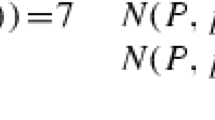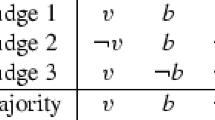Abstract
In their foundational work, List and Pettit formalized the judgment aggregation framework and showed that the preference aggregation framework from social choice theory can be mapped into it, arguing that the reverse was not possible. We show that a natural extension of a graph-theoretic representation of the preference aggregation framework indeed allows us to embed also the judgment aggregation framework. Moreover, we show that many concepts from the two original frameworks match up under the new one, show that it is possible to detect “logical consistency” with graph-theoretical properties, and give a new nuanced comparison between the doctrinal paradox and the Condorcet paradox.






Similar content being viewed by others
Notes
Notice that a cycle is not necessarily a Condorcet cycle, except when only 3 preferences are given as in the historical example made by Condorcet himself. Indeed a Condorcet winner can exits even if there is a cycle.
List and Pettit encode judgments using sets of propositions while we use a functions to preserve coherence with the rest of the paper. The two encodings are equally expressive.
Notice that this has different meaning on atomic and compound propositions. Indeed while for the atomic ones the values of all other propositions are fixed if and only if we are comparing vertices with Humming distance 1, for compound propositions this is not necessarily true.
References
Amendola G, Settepanella S (2012) Optimality in social choice. J Math Sociol 36:44–77
Amendola G, Marengo L, Pirino D, Settepanella S, Takemura A (2015) Decidability in complex social choices. Evol Inst Econ Rev 12:141–168
Brennan G (2001) Collective coherence? Int Rev Law Econ:197–211
de Caritat marquis de Condorcet J-A-N (1785) Essai sur l’Application de l’Analyse aux Probabilités de Decision Rendue à la Pluralité des Voix. Imprimerie Royale, Paris
Denzau AT, Mackay RJ (1981) Structure-induced equilibria and perfect-foresight expectations. Am J Polit Sci 25:762–779
Dietrich F (2006) Judgment aggregation: (im)possibility theorems. J Econ Theory:286–298
Dietrich F, List C (2007a) Arrow’s theorem in judgment aggregation. Soc Choice Welfare 29:19–33
Dietrich F, List C (2007b) Judgment aggregation without full rationality. Soc Choice Welfare 31:15–39
Dietrich F, List C (2013) Propositionwise judgment aggregation: the general case. Soc Choice Welfare 40:1067–1095
Dietrich F, List C (2017) Probabilistic opinion pooling generalized. part one: general agendas. Soc Choice Welfare 48:747–786
Dietrich F, Mongin P (2010) The premiss-based approach to judgment aggregation. J Econ Theory:562–582
Dokow E, Holzman R (2010) Aggregation of binary evaluations. J Econ Theory:495–511
Enelow JM, Hinich MJ (1983) Voting one issue at a time: the question of voter forecasts. Am Polit Sci Rev 77:435–445
Grossi D, Pigozzi G (2014) Judgment aggregation: a primer. Synth Lect Artif Intell Mach Learn:1–151
Kornhauser LA, Sager LG (1993) The one and the many: adjudication in collegial courts. Calif Law Rev 81:1–59
Kramer GH (1972) Sophisticated voting over multidimensional choice spaces. J Math Sociol 2:165–180
List C (2012) Social choice theory. In: Zalta E (ed) Stanford encyclopedia of philosophy. The Metaphysics Research Lab, Stanford
List C, Pettit P (2002) Aggregating sets of judgements: an impossibility result. Econ Philos 18:89–110
List C, Pettit P (2004) Aggregating sets of judgements: two impossibility results compared. Synthese 140:208–235
Marengo L, Pasquali C (2011) The construction of choice. a computational voting model. J Econ Interac Coord 6:139–156
Marengo L, Settepanella S (2014) Social choice among complex objects. Annali della Scuola Normale Superiore Pisa Classe di Scienze 13:1–26
May K (1952) A set of independent necessary and sufficient conditions for simple majority decision. Econometrica 20:680–684
Mongin P (2008) Factoring out the impossibility of logical aggregation. J Econ Theory:100–113
Mongin P (2018) Judgment aggregation. Introd Formal Philos:pp 705–720
Nehring K, Puppe C (2008) Consistent judgement aggregation: the truth-functional case. Soc Choice Welfare:41–57
Nehring K, Puppe C (2010) Abstract arrowian aggregation. J Econ Theory:467–494
Pauly M, van Hees M (2006) Logical constraints on judgment aggregation. J Philos Logic:569–585
Pettit P (2001) Deliberative democracy and the discursive dilemma. Philos Issues:268–299
Shepsle KA (1979) Institutional arrangements and equilibrium in multidimensional voting models. Am J Polit Sci 23:27–59
Zhang YX (2018) Applying fourier analysis to judgment aggregation. arXiv:1810.11582
Acknowledgements
We wish to thank Yoshiki Nakajima for his initial exploration of this work with the first two authors and the two anonymous referees for their very insightful comments which helped to improve the paper.
Author information
Authors and Affiliations
Corresponding author
Ethics declarations
Conflict of interest
On behalf of all authors, the corresponding author states that there is no conflict of interest.
Additional information
Publisher's Note
Springer Nature remains neutral with regard to jurisdictional claims in published maps and institutional affiliations.
About this article
Cite this article
Marengo, L., Settepanella, S. & Zhang, Y.X. Towards a unified aggregation framework for preferences and judgments. Evolut Inst Econ Rev 18, 21–44 (2021). https://doi.org/10.1007/s40844-021-00200-w
Received:
Accepted:
Published:
Issue Date:
DOI: https://doi.org/10.1007/s40844-021-00200-w




